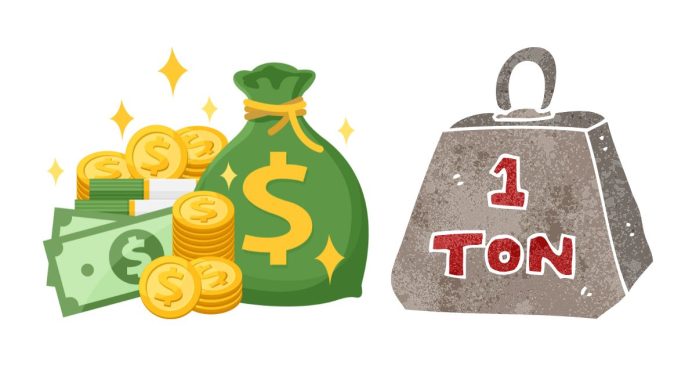When it comes to money and weights, you may have heard the term “ton” used in various contexts. But one common question that arises is: How many dollars are in a ton? While “ton” is typically used as a unit of weight, the concept of “dollars in a ton” can be interpreted in different ways depending on the context—whether you’re talking about the cost of a ton of a specific material, like gold or oil, or just a figurative question. In this blog post, we’ll explore how to understand the concept of weight and value when dealing with tons and dollars.
What Is a Ton?
Before we dive into the question of how many dollars are in a ton, it’s important to clarify what a ton actually is. A ton is a unit of weight used in the imperial system, and there are two types of tons commonly used:
- The Short Ton (U.S. Ton): Equal to 2,000 pounds (approximately 907.18 kilograms).
- The Metric Ton (or Tonne): Equal to 1,000 kilograms (approximately 2,204.62 pounds).
Since “dollars in a ton” could refer to a variety of goods or commodities, it’s important to know which type of ton you’re referring to.
How the Value of a Ton Can Vary
The value of a ton in terms of dollars depends entirely on the material or commodity being measured. For example, a ton of gold will have a vastly different dollar value compared to a ton of sand. Let’s look at a few examples to better understand how the value can vary:
1. Gold
Gold is often measured by weight, and its value can fluctuate daily based on market conditions. As of the current market, gold is typically valued at $1,900 to $2,000 per ounce. There are 32,150.7 ounces in a ton (short ton), so a ton of gold can be worth approximately $60 million to $64 million.
2. Crude Oil
Crude oil prices are generally quoted per barrel, and a ton of crude oil may be worth significantly less than a ton of gold. The price of oil fluctuates based on supply and demand, and as of recent trends, crude oil might be priced around $70 to $100 per barrel. One ton of crude oil (roughly 7 barrels) could thus be worth around $490 to $700.
3. Coal
Coal is another commodity commonly traded by weight. The price of coal varies depending on its quality and the region. A ton of coal might range from $50 to $200, depending on the type of coal and current market conditions.
4. Other Materials
For other materials like sand, gravel, or wheat, the price per ton is often much lower. These goods are generally more abundant and less valuable by weight. For instance, a ton of sand might cost as little as $10 to $30, depending on the quality and the market.
The Importance of Market Fluctuations
The dollar value of a ton is directly linked to market prices, which can fluctuate due to various factors, including:
- Supply and Demand: Prices increase or decrease based on how much of the material is available and how much people are willing to pay for it.
- Economic Conditions: Global economic events or changes in the economy can impact the value of certain commodities.
- Global Events: Natural disasters, geopolitical tensions, or trade policies can affect the supply chain and, consequently, the price of goods.
For example, when demand for oil rises due to geopolitical issues, the price of oil per ton may increase. Similarly, when the price of gold rises due to financial uncertainty, a ton of gold becomes more valuable.
The answer to how many dollars are in a ton depends entirely on the commodity or material you’re measuring. A ton of gold, for instance, can be worth tens of millions of dollars, while a ton of sand might only cost a few dollars. Understanding the specific material being measured and the current market conditions is essential to determining its value.
Have you ever thought about the value of a ton of something specific? Let us know your thoughts or any other questions you have in the comments below!


